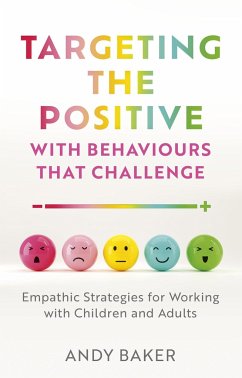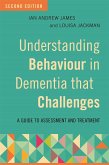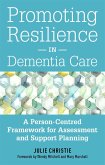Andy Baker
Targeting the Positive with Behaviours That Challenge
Empathic Strategies for Working with Children and Adults
Andy Baker
Targeting the Positive with Behaviours That Challenge
Empathic Strategies for Working with Children and Adults
- Broschiertes Buch
- Merkliste
- Auf die Merkliste
- Bewerten Bewerten
- Teilen
- Produkt teilen
- Produkterinnerung
- Produkterinnerung
An in-depth guide for carers that focuses on the positive, e.g. reduction of behavioural challenges, reduction in the use of restrictive practice, improved morale and relationships, and improved service reputation and lower costs. The author breaks down bigger concepts and ideas that can easily be incorporated into a care setting.
Andere Kunden interessierten sich auch für
![What You Really Want to Know About Life with Dementia What You Really Want to Know About Life with Dementia]() Karen Harrison DeningWhat You Really Want to Know About Life with Dementia27,99 €
Karen Harrison DeningWhat You Really Want to Know About Life with Dementia27,99 €![The Qcs Pool Activity Level (Pal) Instrument for Occupational Profiling The Qcs Pool Activity Level (Pal) Instrument for Occupational Profiling]() Jackie PoolThe Qcs Pool Activity Level (Pal) Instrument for Occupational Profiling49,99 €
Jackie PoolThe Qcs Pool Activity Level (Pal) Instrument for Occupational Profiling49,99 €![A Clinician's Brief Guide to Dementia and the Law A Clinician's Brief Guide to Dementia and the Law]() Nick Brindle (Leeds and York Partnership NHS Foundation Trust)A Clinician's Brief Guide to Dementia and the Law33,99 €
Nick Brindle (Leeds and York Partnership NHS Foundation Trust)A Clinician's Brief Guide to Dementia and the Law33,99 €![A Tattoo on My Brain A Tattoo on My Brain]() Daniel GibbsA Tattoo on My Brain38,99 €
Daniel GibbsA Tattoo on My Brain38,99 €![Understanding Behaviour in Dementia That Challenges, Second Edition Understanding Behaviour in Dementia That Challenges, Second Edition]() Ian Andrew JamesUnderstanding Behaviour in Dementia That Challenges, Second Edition43,99 €
Ian Andrew JamesUnderstanding Behaviour in Dementia That Challenges, Second Edition43,99 €![Enhancing Health and Wellbeing in Dementia Enhancing Health and Wellbeing in Dementia]() Shibley RahmanEnhancing Health and Wellbeing in Dementia49,99 €
Shibley RahmanEnhancing Health and Wellbeing in Dementia49,99 €![Promoting Resilience in Dementia Care Promoting Resilience in Dementia Care]() Julie ChristiePromoting Resilience in Dementia Care27,99 €
Julie ChristiePromoting Resilience in Dementia Care27,99 €-
-
-
An in-depth guide for carers that focuses on the positive, e.g. reduction of behavioural challenges, reduction in the use of restrictive practice, improved morale and relationships, and improved service reputation and lower costs. The author breaks down bigger concepts and ideas that can easily be incorporated into a care setting.
Produktdetails
- Produktdetails
- Verlag: Jessica Kingsley Publishers
- Seitenzahl: 432
- Erscheinungstermin: 21. November 2024
- Englisch
- Abmessung: 226mm x 150mm x 25mm
- Gewicht: 626g
- ISBN-13: 9781839979002
- ISBN-10: 1839979003
- Artikelnr.: 69723935
- Herstellerkennzeichnung
- Libri GmbH
- Europaallee 1
- 36244 Bad Hersfeld
- gpsr@libri.de
- Verlag: Jessica Kingsley Publishers
- Seitenzahl: 432
- Erscheinungstermin: 21. November 2024
- Englisch
- Abmessung: 226mm x 150mm x 25mm
- Gewicht: 626g
- ISBN-13: 9781839979002
- ISBN-10: 1839979003
- Artikelnr.: 69723935
- Herstellerkennzeichnung
- Libri GmbH
- Europaallee 1
- 36244 Bad Hersfeld
- gpsr@libri.de
Andy Baker
Preface. Introduction Chapter 1
What is "Behaviour that Challenges"?. Chapter 2
Prevention Strategies. Chapter 3
Building a Positive Environment Chapter 4
Person
centred Approach. Chapter 5
Environmental Culture. Chapter 6
Behaviour Management Old Logic: Punish/Reward. Chapter 7
Introduction to the 6 Stage Target Model Chapter 8
Identify Maladaptive Behaviours. Chapter 9
Identify Positive Behaviours. Chapter 10
Causes of Behaviours that Challenge
Reflex. Chapter 11
Causes of Behaviours that Challenge
The Human Nervous System.. Chapter 12
Stage 2: Understand/Empathise: Causes of Behaviours that Challenge
Trauma. Chapter 13
Causes of Behaviours that Challenge
Factors that Affect Brain Functioning. Chapter 14
Causes of Behaviours that Challenge
Reactive. Chapter 15
Causes of Behaviours that Challenge
Intentional Chapter 16
Causes of Behaviours that Challenge
The Biopsychosocial Model Chapter 17
Behavioural Analysis. Chapter 18
Introduction. Chapter 19
Developing a Strategy. Chapter 20
Step 1
The Current Strategy. Chapter 21
Step 2
Manage the Stress
Recovery from Trauma. Chapter 22
Step 2
Manage the Stress
Using the HELP Principle. Chapter 23
Step 3
Meet the Need. Chapter 24
Creating the Plan. Chapter 25
Teaching Methods. Chapter 26
Creating a competing pathway. Chapter 27
Relationships
Professional or Personal Chapter 28
Self
awareness and Self
management Chapter 29
The Stages of Escalation Chapter 30
Signs of Escalation Chapter 31
Introspection Chapter 32
Respond Appropriately Chapter 33
De
escalation through Positive Attitude and Empathy Chapter 34
Empathy Chapter 35
Bringing Escalation to a Solution or Resolution. 292 Chapter 36
Eliminating or Supporting to Cope with the Stress Chapter 37 HELP, PROMPT, WAIT, PROTECT Chapter 38
Planned Responses Chapter 39
Stage 6: Learn from Incident APPENDIX 1
How Angry Do You Get? References quoted within this book.
What is "Behaviour that Challenges"?. Chapter 2
Prevention Strategies. Chapter 3
Building a Positive Environment Chapter 4
Person
centred Approach. Chapter 5
Environmental Culture. Chapter 6
Behaviour Management Old Logic: Punish/Reward. Chapter 7
Introduction to the 6 Stage Target Model Chapter 8
Identify Maladaptive Behaviours. Chapter 9
Identify Positive Behaviours. Chapter 10
Causes of Behaviours that Challenge
Reflex. Chapter 11
Causes of Behaviours that Challenge
The Human Nervous System.. Chapter 12
Stage 2: Understand/Empathise: Causes of Behaviours that Challenge
Trauma. Chapter 13
Causes of Behaviours that Challenge
Factors that Affect Brain Functioning. Chapter 14
Causes of Behaviours that Challenge
Reactive. Chapter 15
Causes of Behaviours that Challenge
Intentional Chapter 16
Causes of Behaviours that Challenge
The Biopsychosocial Model Chapter 17
Behavioural Analysis. Chapter 18
Introduction. Chapter 19
Developing a Strategy. Chapter 20
Step 1
The Current Strategy. Chapter 21
Step 2
Manage the Stress
Recovery from Trauma. Chapter 22
Step 2
Manage the Stress
Using the HELP Principle. Chapter 23
Step 3
Meet the Need. Chapter 24
Creating the Plan. Chapter 25
Teaching Methods. Chapter 26
Creating a competing pathway. Chapter 27
Relationships
Professional or Personal Chapter 28
Self
awareness and Self
management Chapter 29
The Stages of Escalation Chapter 30
Signs of Escalation Chapter 31
Introspection Chapter 32
Respond Appropriately Chapter 33
De
escalation through Positive Attitude and Empathy Chapter 34
Empathy Chapter 35
Bringing Escalation to a Solution or Resolution. 292 Chapter 36
Eliminating or Supporting to Cope with the Stress Chapter 37 HELP, PROMPT, WAIT, PROTECT Chapter 38
Planned Responses Chapter 39
Stage 6: Learn from Incident APPENDIX 1
How Angry Do You Get? References quoted within this book.
Preface. Introduction Chapter 1
What is "Behaviour that Challenges"?. Chapter 2
Prevention Strategies. Chapter 3
Building a Positive Environment Chapter 4
Person
centred Approach. Chapter 5
Environmental Culture. Chapter 6
Behaviour Management Old Logic: Punish/Reward. Chapter 7
Introduction to the 6 Stage Target Model Chapter 8
Identify Maladaptive Behaviours. Chapter 9
Identify Positive Behaviours. Chapter 10
Causes of Behaviours that Challenge
Reflex. Chapter 11
Causes of Behaviours that Challenge
The Human Nervous System.. Chapter 12
Stage 2: Understand/Empathise: Causes of Behaviours that Challenge
Trauma. Chapter 13
Causes of Behaviours that Challenge
Factors that Affect Brain Functioning. Chapter 14
Causes of Behaviours that Challenge
Reactive. Chapter 15
Causes of Behaviours that Challenge
Intentional Chapter 16
Causes of Behaviours that Challenge
The Biopsychosocial Model Chapter 17
Behavioural Analysis. Chapter 18
Introduction. Chapter 19
Developing a Strategy. Chapter 20
Step 1
The Current Strategy. Chapter 21
Step 2
Manage the Stress
Recovery from Trauma. Chapter 22
Step 2
Manage the Stress
Using the HELP Principle. Chapter 23
Step 3
Meet the Need. Chapter 24
Creating the Plan. Chapter 25
Teaching Methods. Chapter 26
Creating a competing pathway. Chapter 27
Relationships
Professional or Personal Chapter 28
Self
awareness and Self
management Chapter 29
The Stages of Escalation Chapter 30
Signs of Escalation Chapter 31
Introspection Chapter 32
Respond Appropriately Chapter 33
De
escalation through Positive Attitude and Empathy Chapter 34
Empathy Chapter 35
Bringing Escalation to a Solution or Resolution. 292 Chapter 36
Eliminating or Supporting to Cope with the Stress Chapter 37 HELP, PROMPT, WAIT, PROTECT Chapter 38
Planned Responses Chapter 39
Stage 6: Learn from Incident APPENDIX 1
How Angry Do You Get? References quoted within this book.
What is "Behaviour that Challenges"?. Chapter 2
Prevention Strategies. Chapter 3
Building a Positive Environment Chapter 4
Person
centred Approach. Chapter 5
Environmental Culture. Chapter 6
Behaviour Management Old Logic: Punish/Reward. Chapter 7
Introduction to the 6 Stage Target Model Chapter 8
Identify Maladaptive Behaviours. Chapter 9
Identify Positive Behaviours. Chapter 10
Causes of Behaviours that Challenge
Reflex. Chapter 11
Causes of Behaviours that Challenge
The Human Nervous System.. Chapter 12
Stage 2: Understand/Empathise: Causes of Behaviours that Challenge
Trauma. Chapter 13
Causes of Behaviours that Challenge
Factors that Affect Brain Functioning. Chapter 14
Causes of Behaviours that Challenge
Reactive. Chapter 15
Causes of Behaviours that Challenge
Intentional Chapter 16
Causes of Behaviours that Challenge
The Biopsychosocial Model Chapter 17
Behavioural Analysis. Chapter 18
Introduction. Chapter 19
Developing a Strategy. Chapter 20
Step 1
The Current Strategy. Chapter 21
Step 2
Manage the Stress
Recovery from Trauma. Chapter 22
Step 2
Manage the Stress
Using the HELP Principle. Chapter 23
Step 3
Meet the Need. Chapter 24
Creating the Plan. Chapter 25
Teaching Methods. Chapter 26
Creating a competing pathway. Chapter 27
Relationships
Professional or Personal Chapter 28
Self
awareness and Self
management Chapter 29
The Stages of Escalation Chapter 30
Signs of Escalation Chapter 31
Introspection Chapter 32
Respond Appropriately Chapter 33
De
escalation through Positive Attitude and Empathy Chapter 34
Empathy Chapter 35
Bringing Escalation to a Solution or Resolution. 292 Chapter 36
Eliminating or Supporting to Cope with the Stress Chapter 37 HELP, PROMPT, WAIT, PROTECT Chapter 38
Planned Responses Chapter 39
Stage 6: Learn from Incident APPENDIX 1
How Angry Do You Get? References quoted within this book.








